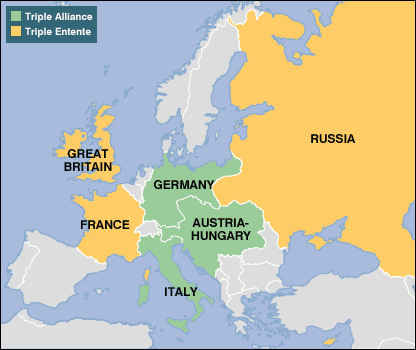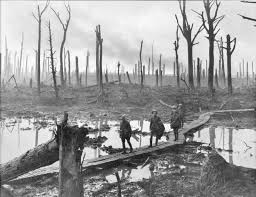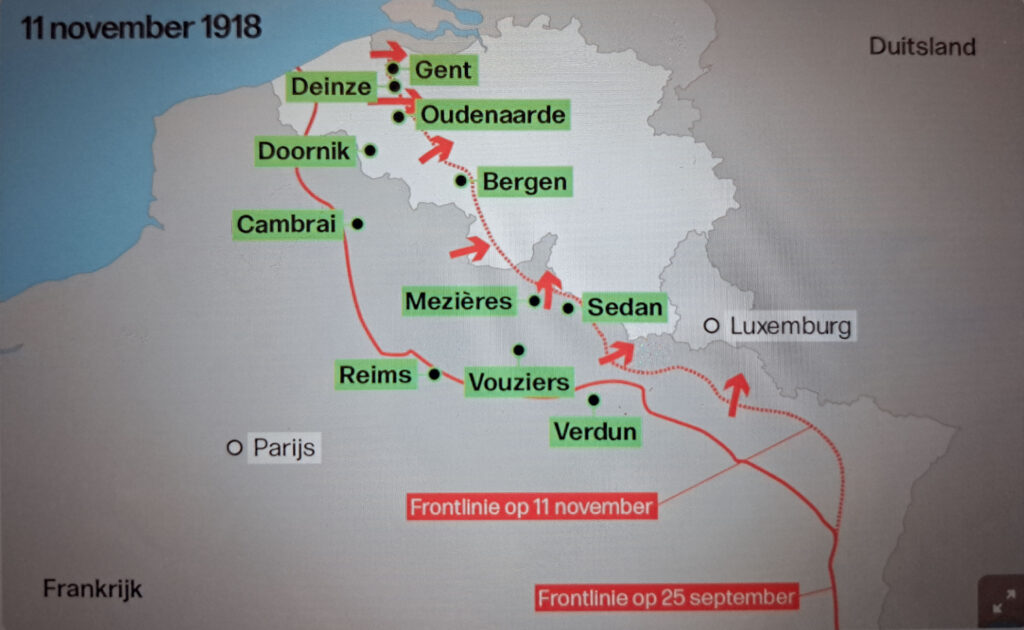Updated 14/11/2025
The First World War, also known as the Great War, has a direct link with the Second World War.
The inhabitants of this beautiful globe find it necessary to exterminate each other in time and destroy the planet.
Cause number one is power. Power over another, over another part of our earth. If the exercise of power over another or another country is also accompanied by religious madness, this can be a reason to completely destroy that person or that country.
The end justifies the means. Religion is a reason, but also expansion drive, the Lebensraum propagated by Hitler, the lack of the necessary raw materials and other matters, can be a reason to declare war on another country and learn it a lesson.
It has always been and will always be like this. Typical feature of the Homo Sapiens.

The government of a country, with a democratically elected government or with a dictator at its head, exercises power over its subjects. Some of the subjects agree with the government, another part does not and the third part often does not care as long as everyday continues with as few problems as possible. The division into supporters and opponents will always remain the same and often hinders the progress of human conditions. An example of this is the great America, where Republicans reverse almost all of the Democrats’ decisions after a reign, vice versa. How silly can you be not to come to the conclusion that a hostile attitude towards each other does not help the country move forward a meter. We should still be glad that the hawks did not get their way and that no civil conflict has broken out even in a country like America. Of course, this is a small group of wranglers, but the masses are apparently unable to relativize everything and drink a beer with each other, republican or democrat. Apparently, the stamp is enough to drive people apart, while if they did not know this stamp, they would be able to live together very pleasantly.
Otherwise it is in a country with a dictatorial power. There is no choice there and the one who believes that the choice should be there is often immediately picked up and in the worst case killed. The examples are countless; China, Russia, North Korea, Iran and many more.

In 1870, the German Empire was proclaimed in Versailles. The Prussian King Wilhelm was appointed Emperor of Germany. Alsace-Lorraine was picked off from the French, something the French had taken from Germany a few centuries earlier. By concluding a number of secret treaties with Russia and Austria-Hungary, a large European bloc was formed with the aim of preventing France from ever again posing a threat to the German Empire. Bismarck was the great architect of the German Empire and its treaties. He behaved like a sole ruler and regularly annoyed Emperor Wilhelm II to the maximum, with the result that Bismarck was fired. His successor, Caprivi, did not extend the secret agreement with Russia because he found out that the treaty did not match the provisions of the secret treaty with Austria-Hungary. As soon as France got wind of this, the French tried to make a treaty with Russia, which succeeded in 1893. The treaty was a secret military treaty directed against Germany. This treaty caused a huge shift in the balance of power in Europe with Germany, Austria-Hungary and Italy on the one hand and Britain, France and Russia on the other. Russia saw something in the treaty because it wanted to expand its influence in the Balkans and had discovered that Austria-Hungary wanted to do the same. Moreover, France wanted to work with Russia to solve the problem around the straits (the Russian fleet was locked in the Black Sea), Austria-Hungary had never shown any interest in that.
In 1882, Italy joined the alliance with Germany and Austria-Hungary, partly due to France’s growing power in North Africa, which Italy itself was interested in. However, Italy proved to be an unreliable ally and also concluded a secret non-aggression treaty with France in 1902, which of course was completely contrary to the secret treaty with Germany and Austria-Hungary. So the alliance had a traitor in the house and would not notice it until later.

France already felt a bit stronger but not yet strong enough to take in Alsace-Lorraine with military means. In search of an additional ally, it was found in Britain that was now looking at economically powerful Germany with suspicion. Germany needed raw materials for the rapidly growing industry. The transport was carried out by the British’s trade fleet with the result that Germany became increasingly dependent on Britain. When Germany decided to build its own trade fleet, it became a huge competitor of the British and the British did not like that at all. The protection of the trade fleet was still carried out by the British war fleet, but Germany proceeded to build its own war fleet to protect the merchant navy. One warship more or less did not matter, especially to deter the possible attackers. This fleet was not built to attack any country and it was not intended to build a larger fleet than that of the British. But the British were not amused and sought an ally on the mainland and France seemed a good choice for that. In 1904, a seemingly trade-oriented agreement was concluded, but, without this being known to most British ministers and the British Parliament, a military cooperation plan was also secretly discussed. After the conclusion of the treaty with the French, Britain also sought rapprochement with Russia and on a visit by the British to Russia in 1909, the first plans for military cooperation were put on the table.

In summary, just before 1914, there were a number of countries that had made a jumble of secret alliances with each other and that were preparing for a war. It did not take too long. Proclaiming the general mobilization would be the starting point of the real war and it was about which country would do that first. France tried to manipulate it in such a way that the enemy would be the first to mobilize, but Russia, France’s ally was the country that first made the decision to start the war. But it’s not that far yet. France, Britain and Russia did not yet consider themselves strong enough to enter into the war and also did not want to be named as the responsible for starting the war. So something had to be created that justified the start of the war.
This incident came on June 28, 1914, when the Hungarian heir to the throne Archduke Frans Ferdinand was assassinated with his wife by Gavrilo Princip, a Serbian terrorist. Austria-Hungary felt threatened by the ongoing terrorist activities in Bosnia-Herzegovina in its existence and on 23 July 1914 set an ultimatum to Serbia, which was not accepted by the Serbs on all counts. Allowing Austrian agents on Serbian territory was a step too far. The next day the Austrian ultimatum became known in Russia and decided to declare a limited mobilization. On July 25, the decision was formally confirmed and the same evening the Austro-Hungarian emperor signed the order for partial mobilization against Serbia. The Tsar doubted whether the war could still be prevented, but on July 30, Tsar Nicolas II announced the general mobilization, not only against Austria, but also against Germany. The Russian general staff realized that this was an indirect declaration of war and tried to keep the Tsar from this. A letter from the German emperor to his cousin Nicolas II also remained without effect. Austria now had no choice and also announced the general mobilization and with that the war was a fact.
As mentioned earlier, the decision to start the war must be charged to Russia. When the mobilization of Russia became known, that also meant for the Germans to proceed to overall mobilization. France declared the mobilization for Germany. On 1 August, Germany went on the attack, occupied Luxembourg and was thus blamed for the First World War. The reality was that Russia had been preparing for the war for years and in particular had supported Serbia with actions on Austro-Hungarian territory. France thus had its own motives and Britain joined Russia and France with the aim of eliminating Germany as a great power and competitor. So Germany was not entirely innocent, but was certainly not the main culprit in the conflict. Italy had now defected and so Germany, together with Austria-Hungary, Turkey and Bulgaria had to compete against the rest of the world. On 4 August, Germany entered Belgium and demanded a free passage from the Belgians, who had until then been neutral. Belgium refused to which Germany also declared war on Belgium. Belgium was the victim. Several battles have taken place: around the forts near Liège, Halen, Dinant, Tienen, Aalst, Mechelen, Dendermonde and Charleroi. The forts of Walem, Sint-Katelijne-Waver and Koningshooikt are given up after 3 days of bombing. Antwerp will be bombarded with zeppelins on 2 September. Dendermonde will be burned down on September 5. On 29 September, Lier, Duffel, Tisselt, Londerzeel and Heist-op-den-Berg will be bombed, Mechelen will be definitively abandoned and the Belgian troops will return to Antwerp. On 3 October, Lier and Herentals will be the victim of German terror. Kempian villages are being burned down. On 6 October, Antwerp will be bombed with 4000 grenades and 140 zeppelin bombs. More than 1 million Belgians flee to the Netherlands. On 9 October, the battle of Antwerp will be over. On October 16, the German army reaches Damme, Zeebrugge, Knokke and Ostend.

Due to the inundation of the area on the Yser, the front is stuck in Flanders and in France. Then the 4-year trench war begins. What followed was a pointless trench battle that cost millions of victims. At the Battle of Verdun and the Battle of the Somme, more deaths and injuries fell together than in all the battles of the century before. It only slowly dawned on the commanders that defenders were always in favor. Attackers were killed in large numbers because the old combat and weapons technique had become hopelessly old-fashioned.

Fronts
In Europe:
Western Front Germany versus Belgium, Luxembourg and France. Eastern Front, Germany/Austria versus Russia. Balkanfront, Austria versus Serbia and later also Romania, Montenegro, Bulgaria and Greece. Italian front, Austria versus the defected Italians.
In Africa:
German-Southwest Africa (Namibia), a German colony versus the Commonwealth. West Africa (Cameroon and Togo). German East Africa (Tanzania, Rwanda and Burundi, Portuguese-Mozambique). The Germans were quickly defeated. The last German troops fought a guerrilla battle in Portuguese- Mozambique against the Portuguese and the British for some time. The conquered colonies were divided.
Asian Front:
Tsingtao, Germany versus Japan and Britain.
Fronts in the Middle East:

Caucasus, Turks versus the Russians. Mesopotamia, invasion of Iraq by the British. Palestinian front, Sinai and Palestine, the British versus the Turks. Dardanelles front, the British versus the Turks.
At first, Germany seemed to be winning the war. Large armies lay in trenches opposite each other in a line that ran from the Swiss border to the North Sea. In frantic attacks over and over again, millions of soldiers died without making even a metre of ground gain. America was involved in the war on April 7, 1917. A German submarine had sunk the American ship Lusitania, resulting in 1200 casualties. After some provocative actions, the U.S. declared Germany the war and in the summer of 1918 a large fresh armed forces arrived that could be deployed on the side of the Allies. Partly because of this, the German strength was broken in 1918 and Ludendorff saw that Germany could no longer win the war. A whole generation of young people had since died on the colossal battlefield. A total of 9 million soldiers and 1 million civilians were killed. In addition, almost 6 million civilians died from hunger and disease.

On 11 November 1918 at 11.11 am the bloodiest conflict so far came to an end. On 8 November 1918, talks were launched in a train car in Compiegne about a ceasefire. On November 11 in the early morning, a full agreement was finally reached. Exactly at 11 a.m., the weapons would be silent. The negotiators needed 6 hours to notify all armies at the front. Yet there have been generals who have ordered heavy attacks in the last hours. For the Canadian general Currie, conquering the city of Bergen (Mons) was a matter of prestige. General Wright ordered the city of Stenay, although he was aware of the ceasefire. 60 American boys died in the final minutes.
During the armistice negotiations, the Allies seized their opportunity and forced the Germans to full capitulation. Germany accepted these demands with the knife to the throat and was forced to sign the Treaty of Versailles. This treaty put an end to the war but became the starting point for the next war because Germany was completely undressed. It was already obvious that the Germans would revolt against this in the future. See the article about the origin of the NSDAP.
Source:
The First World War – Hans Andriessen
The First World War – Henk van der Linden
Wikipedia